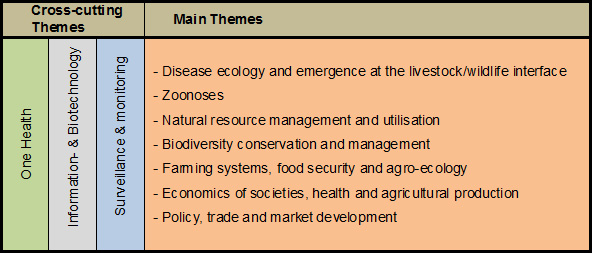Research in the MCP is aimed at being multidisciplinary where necessary and relevant to major stakeholders which include the community, conservation areas, various authorities and the ecosystem. The geographic position of the study area provides numerous opportunities to study the complex interactions between various organisms at the wildlife/livestock interface ranging from single cell pathogens to large mammalian hosts. Very important to our research are questions related to the health of the people, animals and the ecosystem and climate in which they exist as well as the drivers responsible for systems change and disease emergence. Therefore, understanding the major factors influencing the sustainability and the change thereof in this complex socio-ecological system is very important because it relates to the health of the ecosystem and its inhabitants – both physically and socio-economically.
The first research activities that took place in the study area aimed to gain a better understanding of the needs and challenges with which the community and its people, animals and environment are faced. Baseline information was collected in the form of focussed group discussions that led to the development of two questionnaires aimed at livestock owners. The first questionnaire focussed on resource management and utilisation, cattle production and marketing as well as the socio-economical profiles of cattle owners and their households. The second questionnaire focussed on veterinary service delivery, animal health investment and the identification of key animal health constraints. In total, 270 of the approximately 1’300 registered cattle owners in the area were questioned extensively. Farmers were randomly selected during dip tank assemblies and the latest technology was used for the survey. Local interpreters were identified and trained together with their surveyors. PDAs with the latest questionnaire programming software were used to conduct the surveys. This process allowed for faster surveying and less room for errors. Questionnaires were uploaded unto a secure server at the end of every day.
Initial results have already contributed to identify projects to address major concerns, such as the effectiveness of the acaracide and dipping systems used and the impact of ticks-bourne diseases tick worry. An evaluation of trade activity and market constraints were initiated to assist in finding possible solutions for poor trade activity and low prices obtained for livestock products. Complete ecological surveys of Andover, Manyeleti and the communal grazing land by four postgraduate students formed part of the baseline information collected. Diseases that may be responsible for the low reproductive rates in the livestock has subsequently also been investigated. Several important zoonotic pathogens, such as rabies, are currently investigated in Mnisi – both in animal and human subjects.
The MCP is still in its development stages but has already contributed significantly to the well-being of the people of Mnisi. As baseline research continues, the new information highlights the limitations of current understanding and knowledge-gaps, which continually positions this programme as a prime candidate to resolve complex challenges at the human/animal/ecosystem interface.

Copyright © University of Pretoria 2025. All rights reserved.
Get Social With Us
Download the UP Mobile App